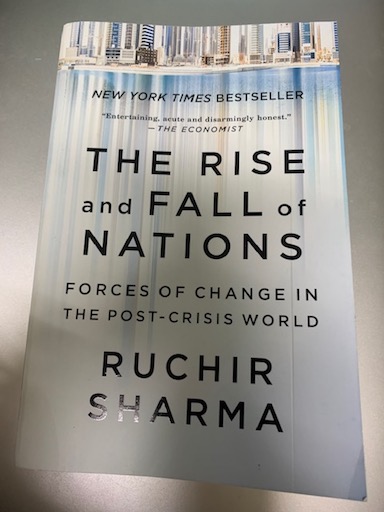
In September 2020 I read:
Ruchir Sharma’s ‘The Rise and Fall of Nations - Forces of Change
in the Post-Crisis World ’ published in 2016.
Sharma is in a top position at Morgan Stanley Investment
Management and I got interested in reading this book
from seeing him interviewed on TV and speaking on ‘Viewsnight’ on
BBC’s ’Newsnight’:
https://www.bbc.co.uk/programmes/p05dstj7
His jetsetting life means that there is a lot of ‘namedropping’
and ‘placename dropping’. He also has access to
his team for research support, which can be imagined from the
amount of data and statistics which are provided.
Each chapter focusses on an aspect which can be positive or
negative for countries, such as how beneficial or
detrimental its wealthy are (Good Billionaires, Bad Billionaires),
its location (The Geographic Sweet Spot) and
the position of its currency (Cheap is Good).
Many interesting points are included, such as:
Although investment represents a much smaller share of the economy
than consumption (often around 20%),
it is more volatile during periods of growth or recession (six
times more volatile in the U.S.). (p.15)
Aging is a key factor. As he writes, “a 1 percentage point decline
in growth in the labor force will shave
about 1 percentage point off economic growth.” Typically, half of
the growth in an economy comes from
growth in the labor force and half from productivity gains. Both
are slumping.” (p.19) Demographic change
is accelerating, with the share of people over 65 in China
doubling in the first twenty seven years of the
21st century, a process which took 115 years in France and 69
years in the U.S. (p.39)
Developing countries experience “sharp upturns” and “prolonged
downturns”, which can put progress
back severely. (p.61) This is also tied to the situation
that, “a large majority of these roller-coaster economies
were governed by autocrats, and the result was long-term
stagnation.” (p.88) In general, he sees political
leaders who stay too long as becoming stale and reducing or
erasing their early progress. Complacency is
a key problem in positive economic times, leading to waste
including with investment. He quotes former
Indonesian finance minister, Muhammad Chatib Basri, who said, “Bad
times make for good policy, and
good times make for bad policy.” (p.93)
Manufacturing remains important, although some countries turn
their backs on it. As he indicates, “Worldwide,
flows of goods amount to about 18 trillion dollars a year,
significantly greater than flows of both services and
capital, which account for about 4 trillion each.” (p.176) At the
time that he wrote, seven developed countries
had manufacturing accounting for nearly 20% of GDP or more:
Austria, Germany, Japan, Liechtenstein,
Singapore, South Korea and Switzerland. (p.215)
Forecasting the future is challenging. Sharma refers to the fact
that, “The most common job for American men
is driving, and one forecast has driverless smart cars and trucks
replacing them all by 2020.” (p.54) in just four
years from the time of writing, that has not happened.
This book was written before Covid 19 (Corona), with the 'crisis'
in the title referring to the 2008 banking crisis,
known as the 'Lehmann Shock' in Japan. Sharma indicates that
recovery from that has been slow. Apparently
Sharma does not see Covid-19 as leading to severe longterm
effects:
https://www.financialexpress.com/lifestyle/pandemic-changes-nothing-on-its-head-will-have-no-enduring-impact-ruchir-sharma/2092328/
However, it would seem that it will set back economic progress in
developing countries, where there is hardly any
or no safety net for the poorest, at least for some time.
Additionally, Sharma quotes Rudiger Dornbusch, a former
MIT economist, who said that crises, “take a much longer time
coming than you think, but happen much faster than
you would have thought.” (p.272-3) That seems to fit the Covid-19
situation.
Read about other books which I have read.
